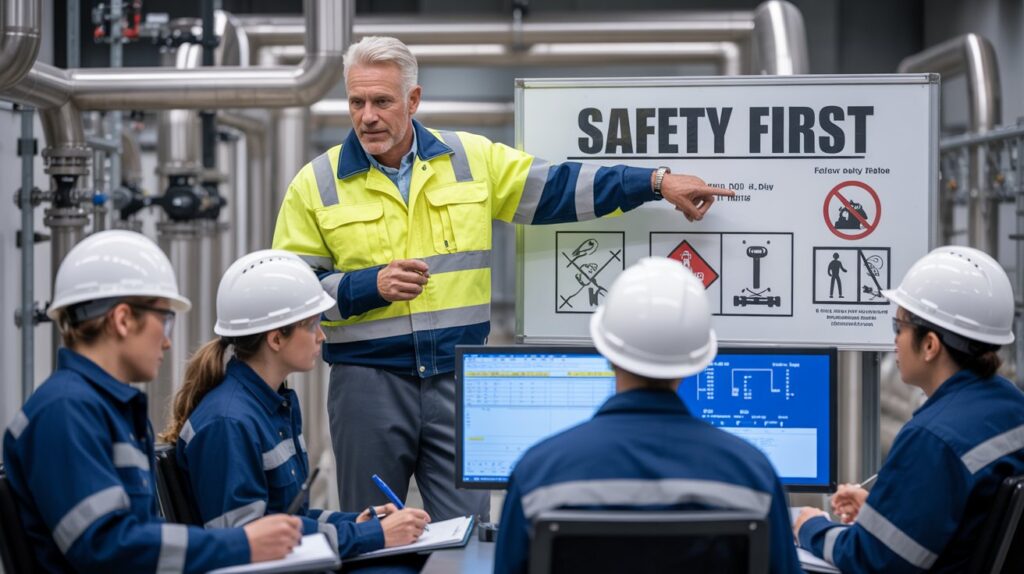Becoming a wastewater operator is a career path that doesn’t necessarily require a college degree, but it does demand a diverse set of skills, as noted by the US Bureau of Labor Statistics. With the increasing complexity of wastewater treatment processes and the critical role these professionals play in water quality management, the need for skilled operators has never been more pressing.
The role of a modern wastewater operator is multifaceted, requiring not only technical knowledge but also analytical and problem-solving skills. As wastewater treatment technologies evolve, operators must stay abreast of the latest developments to ensure effective and efficient operation of treatment plants.
Key Takeaways
- Understanding the diverse skills required for wastewater operators.
- The importance of technical proficiency in wastewater treatment.
- The role of analytical and problem-solving skills in water quality management.
- The need for ongoing training and certification for wastewater operators.
- Staying updated with emerging technologies in wastewater treatment.
The Evolving Landscape of Wastewater Management
The wastewater management sector is undergoing a significant transformation, driven by advancements in treatment technologies and changing environmental regulations. This evolution is not only changing how wastewater is treated but also the skills required by operators in the field.
From Basic Treatment to Resource Recovery
Traditionally, wastewater treatment focused on removing pollutants and contaminants. However, the industry is now shifting towards resource recovery, viewing wastewater as a valuable resource rather than waste. This change is driven by advancements in wastewater treatment technologies that enable the recovery of water, energy, and nutrients.
Increasing Complexity of Modern Systems
Modern wastewater systems are becoming increasingly complex, incorporating advanced environmental engineering principles and technologies. Operators must now navigate a landscape of sophisticated treatment processes, automation, and data analytics, all while ensuring compliance with wastewater regulations.
The Multifaceted Role of Today’s Operator
According to Treatment Plant Operator Magazine, the industry is facing a significant challenge with over 50% of the workforce retiring in the next 5-10 years. This statistic underscores the need for a new generation of operators who are equipped to handle the multifaceted demands of modern wastewater management. Today’s operators must possess a blend of technical, analytical, and communication skills to effectively manage complex systems, interpret data, and collaborate with various stakeholders.
The industry’s shift towards sustainability and resource recovery requires operators to be adaptable and committed to ongoing learning, ensuring they stay abreast of the latest technologies and regulatory requirements.
Technical Proficiency: The Foundation of Operational Excellence
Wastewater operators must possess a strong foundation in technical proficiency to ensure operational excellence. This involves a comprehensive understanding of various aspects of wastewater treatment.
Understanding Biological and Chemical Treatment Processes
A critical component of technical proficiency is understanding the biological and chemical processes involved in wastewater treatment. Operators need to grasp how different processes, such as activated sludge and biological nutrient removal, work to treat wastewater effectively. Chemical treatment processes, including coagulation and disinfection, are equally important.
Equipment Operation and Preventative Maintenance
Operators must be skilled in the operation and maintenance of equipment used in wastewater treatment plants. This includes pumps, aeration systems, and sludge handling equipment. Regular preventative maintenance is crucial to prevent equipment failures and ensure continuous operation.
Troubleshooting and Process Optimization
Effective troubleshooting is essential for identifying and resolving issues that arise during treatment processes. Operators should be able to analyze data, identify problems, and implement corrective actions. Moreover, they should continually look for opportunities to optimize treatment processes, improving efficiency and reducing costs.
By focusing on these areas, wastewater operators can enhance their technical proficiency, contributing to the overall excellence of wastewater treatment operations.
Essential Skills for Modern Wastewater Operators
Modern wastewater operators must possess a unique blend of technical knowledge and soft skills to excel in their increasingly demanding roles. The complexity of modern wastewater treatment processes requires operators to be proficient in a wide range of areas.
The Skill Matrix: Technical vs. Soft Skills
A successful wastewater operator needs to balance technical skills, such as understanding biological and chemical treatment processes, with soft skills like communication, teamwork, and problem-solving. Technical skills form the foundation of operational excellence, while soft skills enable effective collaboration and adaptation to changing circumstances.
Career-Long Learning Requirements
The wastewater industry is constantly evolving, with new technologies and regulations emerging regularly. As such, ongoing training and professional development are crucial for operators to stay current and competent. This might involve formal education, workshops, or on-the-job training programs focused on areas like water quality management and wastewater operator training.
Balancing Specialization and Versatility
While specialization in specific areas of wastewater treatment can be beneficial, operators also need to be versatile enough to handle a variety of tasks and unexpected challenges. Striking this balance is key to maintaining operational efficiency and ensuring compliance with regulatory requirements.
By focusing on developing both technical and soft skills, and committing to lifelong learning, modern wastewater operators can excel in their roles and contribute to effective water quality management.
Analytical and Laboratory Expertise
Analytical and laboratory expertise are the backbone of effective wastewater treatment and management. Operators must be skilled in various laboratory techniques and analytical methods to ensure that wastewater is treated to the required standards.
Water Quality Testing and Sampling Protocols
Wastewater operators must be proficient in collecting and analyzing samples, following strict sampling protocols to ensure data accuracy. This involves understanding different water quality testing methods and being aware of the parameters that need to be monitored.
Data Interpretation and Trend Analysis
Once data is collected, operators must be able to interpret it correctly, identifying trends and patterns that could indicate issues with the treatment process. This requires a strong understanding of data analysis techniques and the ability to make informed decisions based on the data.
Quality Assurance and Control Procedures
Implementing quality assurance and control procedures is crucial to maintaining compliance with wastewater regulations. Operators must ensure that all laboratory tests are conducted accurately and that any issues are addressed promptly.
| Laboratory Test | Frequency | Purpose |
|---|---|---|
| pH Level | Daily | To ensure optimal treatment conditions |
| BOD (Biochemical Oxygen Demand) | Weekly | To assess organic pollution levels |
| TSS (Total Suspended Solids) | Daily | To monitor solid waste levels |
By combining analytical and laboratory expertise with a deep understanding of industry best practices, wastewater operators can ensure that treatment plants operate efficiently and effectively, meeting all regulatory requirements.
Digital Literacy in an Automated Environment
The integration of digital technologies in wastewater treatment demands a digitally savvy workforce. As treatment plants become increasingly automated, operators must be proficient in using various digital tools to ensure efficient and effective operation.
SCADA Systems and Process Control
Supervisory Control and Data Acquisition (SCADA) systems are critical in modern wastewater treatment. These systems enable operators to monitor and control processes remotely, optimizing treatment efficiency and responding to issues promptly. Understanding how to use SCADA systems is essential for effective process control and environmental engineering.
Data Management and Reporting Software
Wastewater treatment plants generate vast amounts of data, from flow rates to water quality parameters. Operators must be able to manage this data using specialized software, generating reports that help in decision-making and regulatory compliance. Proficiency in data management tools is crucial for maintaining operational transparency and efficiency.
Mobile Applications and Remote Monitoring
Mobile applications and remote monitoring technologies allow operators to oversee treatment processes on-the-go. This flexibility is invaluable in responding to emergencies and optimizing plant performance. Operators must be comfortable using these technologies to stay connected to the treatment process at all times.
Cybersecurity Awareness for Critical Infrastructure
As wastewater treatment becomes more reliant on digital technologies, cybersecurity becomes a critical concern. Operators must be aware of the risks associated with connected systems and take steps to mitigate them, protecting the integrity of the treatment process and ensuring public safety.
| Digital Tool | Function | Benefit |
|---|---|---|
| SCADA Systems | Process Control and Monitoring | Enhanced Efficiency and Response |
| Data Management Software | Data Analysis and Reporting | Improved Decision Making |
| Mobile Applications | Remote Monitoring | Increased Flexibility and Responsiveness |
Regulatory Compliance and Documentation
Regulatory compliance is a cornerstone of effective wastewater management, requiring operators to be well-versed in current laws and regulations. Wastewater treatment plants must adhere to a myriad of federal, state, and local regulations, making it essential for operators to stay informed about the latest legal requirements.
Navigating Federal and State Regulations
Wastewater operators must understand the complex regulatory landscape, which includes federal laws such as the Clean Water Act and state-specific regulations. Compliance with these regulations is not only mandatory but also crucial for environmental protection. Operators should be aware of the National Pollutant Discharge Elimination System (NPDES) permits, which are required for wastewater treatment plants to discharge treated effluent into water bodies.
Permit Requirements and Violation Prevention
Permit requirements are a critical aspect of regulatory compliance. Operators must ensure that their facilities meet all permit conditions to avoid violations. Regular monitoring and reporting are essential to demonstrate compliance. In case of non-compliance, operators should have a clear understanding of the steps needed to rectify the situation and prevent future violations.
| Regulatory Aspect | Description | Importance |
|---|---|---|
| Federal Regulations | Adherence to national laws such as the Clean Water Act | High |
| State Regulations | Compliance with state-specific laws and guidelines | High |
| NPDES Permits | Permits required for discharge into water bodies | Critical |
Record-Keeping and Reporting Best Practices
Accurate record-keeping and timely reporting are vital components of regulatory compliance. Operators should maintain detailed records of treatment processes, monitoring data, and maintenance activities. Effective record-keeping helps in demonstrating compliance during regulatory inspections.
Preparing for Regulatory Inspections
To prepare for regulatory inspections, operators should ensure that all records are up-to-date and easily accessible. Conducting internal audits can help identify areas of non-compliance before an official inspection. Operators should also be prepared to provide detailed information about their treatment processes and compliance strategies.

Problem-Solving and Adaptive Decision Making
In the complex world of wastewater management, operators must be adept at handling unexpected problems. Effective problem-solving and adaptive decision-making are essential skills for wastewater operators to manage complex treatment processes and respond to emergencies.
Systematic Troubleshooting Approaches
Wastewater operators must be able to identify and resolve issues efficiently. This involves a systematic approach to troubleshooting, including monitoring process parameters, analyzing data, and applying knowledge of treatment processes.
Emergency Response and Crisis Management
Operators must be prepared to respond to emergencies such as equipment failures or process upsets. This requires having emergency response plans in place, conducting regular drills, and staying calm under pressure.
Cost-Effective Solution Development
Developing cost-effective solutions is crucial for wastewater treatment plants to balance operational costs with regulatory compliance. Operators should consider factors such as energy efficiency, chemical usage, and waste minimization when optimizing processes.
Case Studies: Creative Problem-Solving in Action
Several wastewater treatment plants have successfully implemented creative problem-solving strategies. For example, one plant reduced energy consumption by optimizing aeration system operation, while another improved effluent quality by implementing a new biological treatment process.
| Problem-Solving Strategy | Implementation Example | Outcome |
|---|---|---|
| Optimizing Aeration Systems | Adjusted aeration rates based on real-time data | Reduced energy consumption by 15% |
| Biological Treatment Process Upgrade | Implemented a new biological treatment technology | Improved effluent quality by 20% |
Interpersonal and Communication Skills
The role of a wastewater operator involves not only technical expertise but also strong interpersonal and communication skills. Effective communication is vital for collaborating with colleagues, conveying information to the public, and producing technical reports.
Cross-Departmental Collaboration
Wastewater operators must work closely with various departments, including maintenance, laboratory, and management teams. Strong teamwork enables them to address operational challenges efficiently and implement improvements.
Public Relations and Community Education
Operators often serve as a liaison between the treatment plant and the community. They must be able to communicate complex technical information in an accessible way, fostering public understanding and support for wastewater management practices.
Technical Writing and Reporting
Accurate and clear technical writing is essential for reporting on plant operations, compliance with regulations, and other critical information. Operators must be able to convey complex data in a concise and understandable manner.
Conflict Resolution in Team Environments
In team settings, conflicts can arise. Operators with strong interpersonal skills can resolve these conflicts effectively, ensuring a harmonious and productive work environment. Active listening and empathy are key components of successful conflict resolution.
Safety Leadership and Risk Management
Safety leadership and risk management are vital components of modern wastewater treatment. Effective safety leadership is not just about following regulations; it’s about creating a culture that prioritizes safety above all else.
Hazardous Materials Handling
Wastewater treatment operators must be trained in handling hazardous materials safely. This includes understanding the properties of chemicals used in treatment processes and knowing how to respond in case of a spill or leak.
Confined Space and Lock-Out/Tag-Out Procedures
Operators must also be knowledgeable about confined space entry procedures and lock-out/tag-out protocols to prevent accidents. Proper training and equipment are crucial for ensuring safety in these situations.
Building a Culture of Safety
Building a culture of safety involves more than just following procedures; it requires leadership commitment and employee engagement. Regular training and safety drills can help reinforce this culture.
Incident Prevention and Response
A key aspect of safety leadership is preventing incidents before they occur. This involves identifying potential hazards and taking proactive measures. In case of an incident, having a well-planned response is critical.

- Regular safety training for all employees
- Implementation of safety protocols for hazardous materials handling
- Conducting regular safety audits and drills
Sustainability and Resource Recovery Practices
Resource recovery and sustainability are redefining the wastewater industry, turning what was once considered waste into valuable resources. This shift is driven by the need to reduce environmental impact while maximizing the utility of treated wastewater and its byproducts.
Energy Efficiency and Carbon Footprint Reduction
One of the key aspects of sustainability in wastewater treatment is energy efficiency. By optimizing treatment processes and utilizing energy-efficient equipment, operators can significantly reduce their carbon footprint. This not only contributes to environmental sustainability but also helps in reducing operational costs.
Biosolids Management and Beneficial Reuse
Biosolids management has evolved from merely disposing of waste to finding beneficial reuse opportunities. Beneficial reuse includes land application, composting, and energy production through anaerobic digestion. These practices not only reduce waste but also create valuable products.
Water Reclamation and Recycling Initiatives
Water reclamation and recycling are critical components of resource recovery. By treating wastewater to a quality suitable for reuse, communities can supplement their water supplies, reduce the demand on potable water sources, and enhance water security.
Nutrient Recovery Technologies
Nutrient recovery technologies are being increasingly adopted to extract valuable nutrients like nitrogen and phosphorus from wastewater. These nutrients can be used as fertilizers, reducing the need for synthetic fertilizers and promoting sustainable agriculture.
Emerging Technologies and Future Skill Needs
The wastewater industry is on the verge of a technological revolution, driven by emerging technologies that promise to transform treatment processes. As we look to the future, it’s essential to understand the technologies that will shape the industry and the skills operators will need to master.
Advanced Treatment Technologies
Advanced treatment technologies are being developed to improve water quality and increase efficiency. These technologies include advanced filtration systems and nutrient removal processes, which are becoming increasingly important as regulations tighten.
Artificial Intelligence and Predictive Analytics
Artificial intelligence (AI) and predictive analytics are being integrated into wastewater treatment, enabling operators to predict and prevent issues before they occur. This technology allows for more efficient operation and maintenance of treatment plants.
Microbial Fuel Cells and Energy Production
Microbial fuel cells represent a promising technology that can generate energy while treating wastewater. This innovation has the potential to make wastewater treatment more sustainable and energy-efficient.
Preparing for the Next Generation of Treatment Systems
As these emerging technologies become more prevalent, operators will need to develop new skills to work effectively with them. This includes understanding how to operate and maintain advanced systems, as well as how to interpret data from AI and predictive analytics tools.
Conclusion: Becoming a Future-Ready Wastewater Professional
To succeed in the wastewater industry, operators must possess a blend of technical, analytical, and soft skills. Ongoing learning and professional development are vital for staying current with industry best practices and emerging technologies in wastewater treatment.
Mastering essential skills for modern wastewater operators enables professionals to excel in their roles and drive sustainability initiatives. By combining technical proficiency with analytical expertise and digital literacy, operators can optimize wastewater treatment processes and ensure regulatory compliance.
As the industry evolves, the demand for skilled professionals who can adapt and lead will continue to grow. By staying informed about industry best practices and emerging technologies, wastewater professionals can contribute to a more efficient and sustainable industry.
